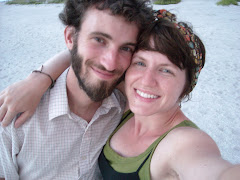I feel like I should update just to let you know what's happening with us here in Port-au-Prince. We've been busy working in the office, which is something new for us in Haiti. City life is nice (odd to say as the city has been so severely damaged): there are people around, electricity to be had, and an abundance of food items that we don't have in Desarmes. The weather is cooler and the distance between our temporary home at the Depps' and the office is more than a five minute walk (this may sound odd, but when your entire week is composed of walking across the street from your home to the office and the odd 10-minute walk to the center of town, a little distance can be nice).
How is the city? Some days I forget that an earthquake happened because stores have opened again, banks are open, and street vendors are crowding the streets as usual. Of course I didn't lose my home, no one in my family died, nor friends, nor co-workers. Every once in a while a bad smell hits you in the face and you remember what has happened, or you drive down a road and look across the valley and an entire neighborhood is rubble.
It's strange to be in a position of judging the level of need that people have and deciding whether or not they merit help. Most of Haiti would not turn down free food aid, tents, tarps, water, or shoes a few months ago, and now everyone is saying they need help. What do you say to a family who hasn't lost their home? What do you say to someone who is still employed and earning a salary? Sometimes the people that have the means and know how to ask are the ones that find aid before those that have more need but don't know how to ask for help.
The other difficult part about watching "aid" pour into the country is that a lot of the aid is going to Americans or Canadians or other international staff members. They are being paid with donation dollars and living and eating within the walls of the UN compound and all sorts of new vehicles and motorcycles are flooding the roads. I can judge other international workers just as much as I can be judged, I guess, but it's just the idea that millions of aid dollars are coming to...pay the salaries of non-Haitians, buy imported foods, etc.
Trying to finish this post... a few days later. Yesterday we dropped Ben and Alexis off at the airport and then we went over to the UN logistics base to try yet again to get IDs for easier access into the logistics base to coordinate with other NGOs or simply get more information about what is really happening here. I left there frustrated, and the drive to the office only heightened my frustration with everything, the international aid response, the traffic, work, etc. The prospect of going to the office just overwhelmed me and as I dropped off Sharon I hopped on a motorcycle to go "home." I got back, showered and sat with my book until I finished it and hung out in utter bliss in my 100% complete privacy (well, except for the cat).
All this to say, it's a bit surreal at times being in the position I'm in and the gravity of the new reality that is here in Haiti. Everything feels somewhat different now, and the country I've come to know over the past 1.5 years is a new place and the job I've come to know over the past 1.5 years is a different job.


